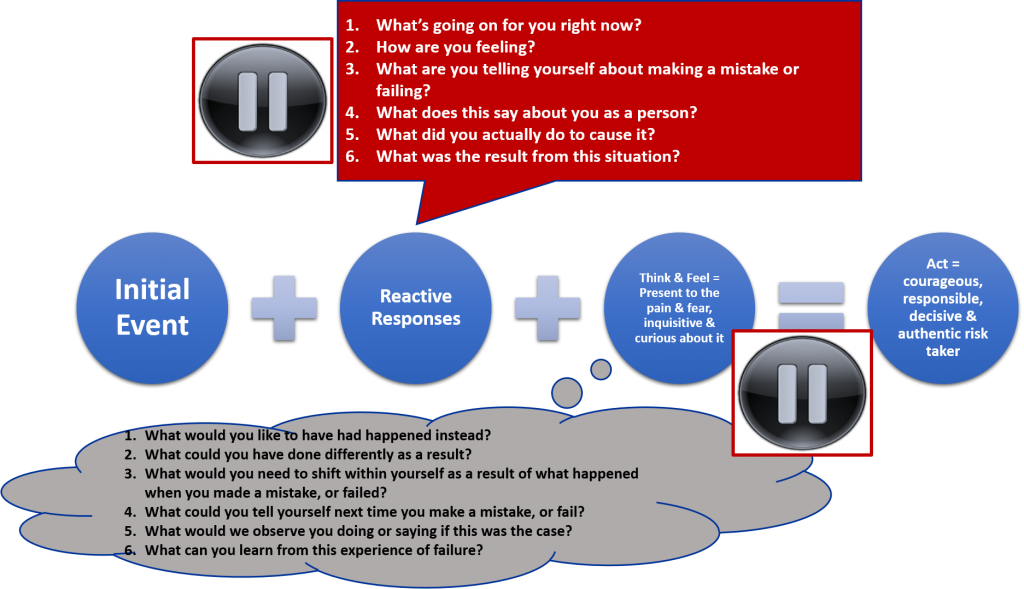In a recent blog, What does it mean to cultivate a fail fast organizational culture we shared what typically happens when people experience failure, and how important it is to uncouple people’s fears about failure and to support and enable them to “normalize” it. How cultivating a fail-fast culture enables organisations to survive, flow and flourish. How it involves learning from mistakes, creating teachable and coachable moments, that interpret and apply failures as manifestations of learning and exploration rather than trying to avoid or out-think them!
We explained that when people fail, they unconsciously sink into a series of reactive responses, that engage them neurologically and emotionally resulting in a range of irrational cognitive (thinking and feeling) distortions, which usually involve disappointment, confusion, and shame. How this detracts from the possibility of creating an environment where there is sufficient psychological safety to take smart risks, experiment and fail.
People then move away from and avoid solving the problem because of these pervasive un-resourceful states and act defensively, which usually involves laying blame, making justifications, excuses, and operating from denial as illustrated below in Diagram 1.
Diagram 1 Typical Reactive Response to Failure
Taking a reflective stance
Alternately, we can use the experience of failure to support ourselves and others we interact with, as a pivot point and as a manifestation of learning and exploration. We achieve this initially, by stopping and taking a reflective stance and intentionally hitting our “pause buttons” and by intentionally creating psychological safety.
Doing this enables us to “work with” what is really going on (the story) when our own, and the mistakes and failures of other people, are involved. It also helps us to cultivate self-awareness, self-regulation and ultimately the self-mastery to deal with making changes, taking risks, learning from mistakes and failing consciously and constructively, and to innovate and learn.
Cultivating Fail Fast teachable and coachable moments
When someone experiences a failure, a more useful strategy could be to support them hit their “pause button” and to then teach them how to better self-regulate and work within it. This allows them the time and space to take a quick “reflective stance” and safely associate with their range of thoughts and feelings and to connect with the results they caused. Illustrated in Diagram 2 below, working this way creates the safe and collective holding space allowing the person to move towards associating with, and acknowledging both the pain and the fear.
It also allows the creation of a new space where they have permission and trust be-come inquisitive and curious. To explore and apply specific questions to uncouple their fear, break their operating pattern and choose a more resourceful response to it next time.
Diagram 2 Choosing a Constructive Response to Failure
Choosing a constructive response to failure
They can then hit the “pause button” a second time and create the safe holding space, and psychological safety, for mindfully generating a teachable and coachable moment. By using the specific questions to generate a new, more resourceful operating pattern, by learning from mistakes, next time a failure occurs.
This enables the person to take responsibility, and acknowledge that their locus of control is within them and when they step into it and own it, they can operate in a container of psychological safety. To leverage talents’ capability to succeed by continually learning from mistakes and failures, and coaching and teaching their people to do so as well.
This way of working allows people, to apply mistakes and failures as “teachable and coachable moments” so that people become less risk-averse, defensive and avoidant. It can be used to empower people to be-come authentically courageous, creative and decisive smart risk-takers and game-changing agility shifters.
Driving our fear and normalizing failure
Cultivating trust in the workplace
One of the key points that Ed Catmull makes is about creating an environment where trust becomes an inherent part of cultivating a fail-fast culture;
It takes patience and acceptance, transparency and authenticity, and consistency and compassion. It requires a collaborative way of working that assumes people come from the best intention and want to see, respond to and solve problems creatively.
Using failures as pivot points, by learning from mistakes, create teachable and coachable moments that unleash peoples’ potential for innovation, and enables organizations to build the foundations for out-innovating their competitors.
This is the second blog in our series of 3 blogs, by Janet Sernack on cultivating a fail-fast culture.
At ImagineNation™ we provide innovation coaching, education and culture consulting to help businesses achieve their innovation goals. Because we have done most of the learning and actioning of new hybrid mindsets, behaviors and skill-sets already, we can help your businesses also do this by opening people up to their innovation potential.
Find out about The Coach for Innovators Certified Program, a collaborative, intimate & deep personalized learning program, supported by a global group of peers over 8-weeks, starting October 22, 2019. It is a deep blended learning program that will give you a deep understanding of the language, principles & applications of a human-centered approach to innovation, within your unique context. Find out more.
Contact us now at janet@imaginenation.com.au to find out how we can partner with you to learn, adapt and grow your business in the digital age.










